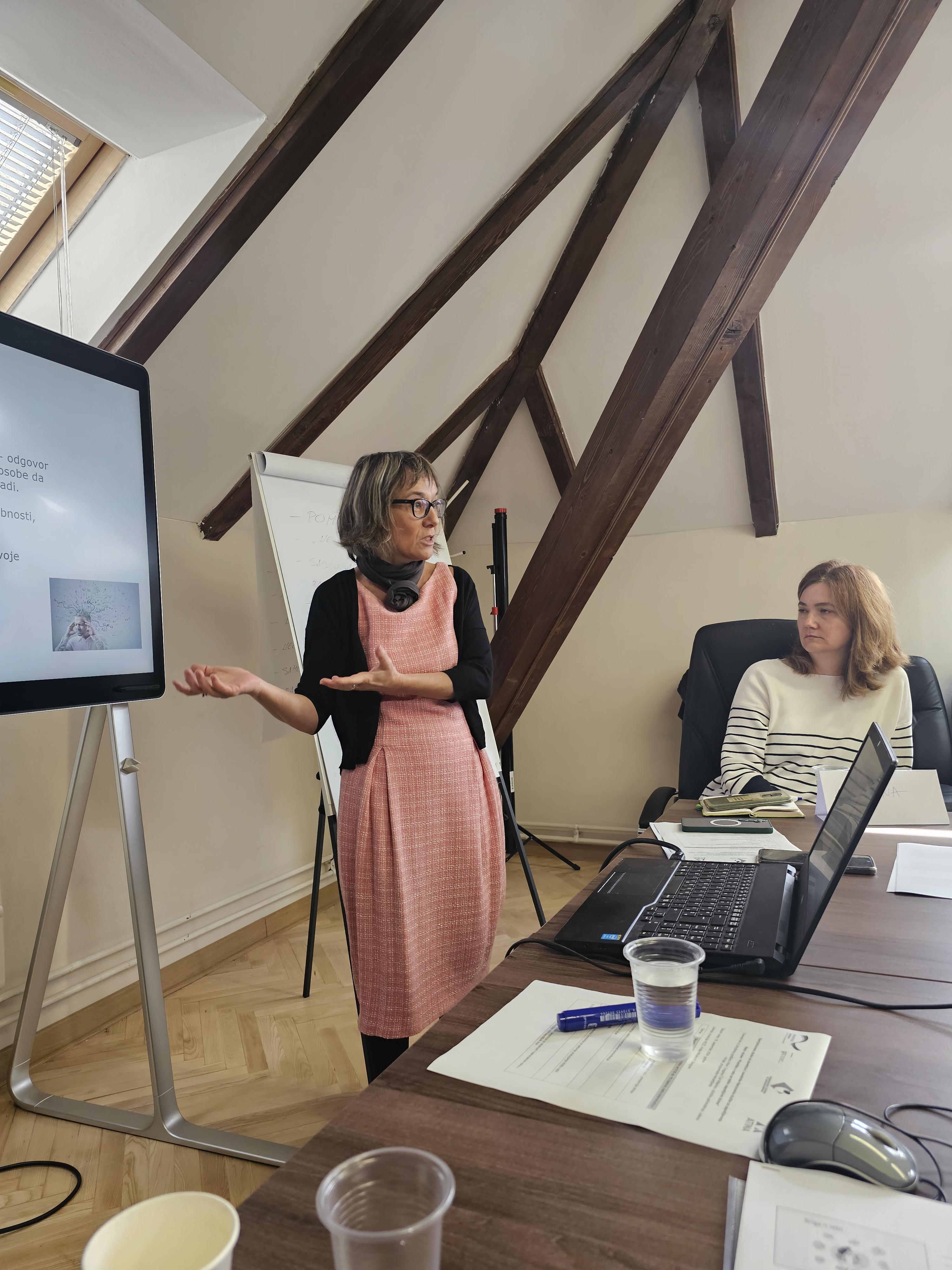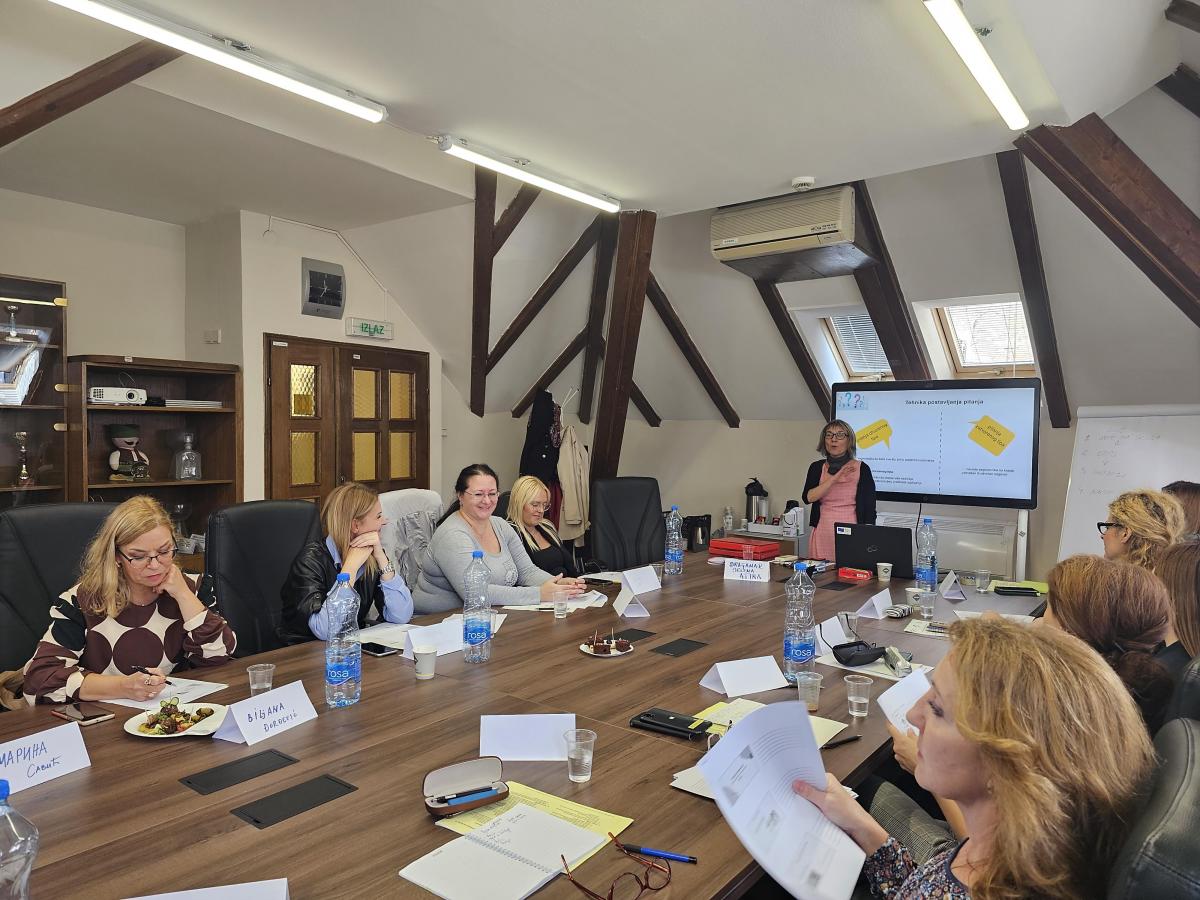Hotline: +381 61 63 84 071
New Approaches in Working with Hard-to-Employ Groups

New Approaches in Working with Hard-to-Employ Groups
Specialized Training for National Employment Service Counsellors
In the second half of 2024, NGO Atina implemented a specialized training program titled “Support in Working with Hard-to-Employ Individuals,” aimed at enhancing the knowledge, skills, and sensitivity of counsellors from the National Employment Service (NES) to provide more effective support to people facing numerous barriers to employment.
This initiative was developed by a dedicated team composed of clinical psychologist Dragana Ćuk Milankov, political scientist Jelena Hrnjak, and social worker Zorana Parezanović—all of whom bring decades of experience in working directly with vulnerable populations through Atina. Their combined expertise shaped a curriculum explicitly tailored for NES professionals, grounded in the real-world challenges and complexities counsellors face in their daily work.
The training was developed in response to needs identified through consultations with NES leadership and representatives of GIZ, and was implemented within the framework of the global program "Centers for Migration and Development" (ZME), conducted by Deutsche Gesellschaft für Internationale Zusammenarbeit (GIZ) GmbH as part of German-Serbian development cooperation. In Serbia, the program is implemented in partnership with the Ministry of Labour, Employment, Veterans, and Social Affairs (MINRZS), the National Employment Service (NES), the Commissariat for Refugees and Migration (KIRS), civil society organizations, and the private sector.
Eight Training Sessions in Six Cities
During the fall of 2024, a total of eight training sessions were held in six cities across Serbia—Belgrade, Novi Sad, Kragujevac, Niš, Čačak, and Užice. Each group consisted of between 13 and 15 participants, creating an intensive and interactive learning environment that fostered knowledge exchange and practical application.The training was carefully structured around four key topics: stress management and burnout prevention; development of constructive communication skills; motivating hard-to-employ individuals for active participation in the labor market, especially those facing structural barriers; building support networks at both the local and national levels.

The training also emphasized equipping employment counselors with the knowledge and sensitivity necessary to work with survivors of human trafficking and domestic violence. These groups often face complex challenges when entering or reentering the labor market. Special attention was given to supporting counsellors in preventing the adverse effects of working with traumatized individuals.
Practice-Based Learning Approach
The training methodology combined visual presentations, case studies, group discussions, role-playing, and post-training evaluations. All participants received printed educational materials, including thematic presentations and checklists designed for daily use, with a focus on burnout prevention and trauma-informed work.
In total, 124 NES representatives attended the training, comprising 117 from local branches and 7 from the NES Directorate. Women comprised 86% of participants, with the majority being over 41 years of age. The average work experience ranged from 16 to 23 years, indicating a highly experienced group that nonetheless benefits from additional support in adopting modern tools and practices in social work and employment counselling.
Feedback and Future Directions
Over 90% of participants reported being fully satisfied with both the training content and its delivery. Around 80% stated they had gained new knowledge and practical skills, especially in stress prevention and communication strategies. Participants emphasized the value of active engagement and peer exchange, which contributed to a strong sense of collaborative learning.
Many attendees had never previously participated in trainings on working with hard-to-employ individuals or managing professional stress, underscoring the importance of ongoing investment in professional development. Expanding future training content to include digital skills and innovative counselling approaches could further enhance effectiveness.
Participant feedback also highlighted the need for greater inclusion of younger professionals and men, as well as the introduction of mentorship programs to bridge the generational and experiential gaps among staff. Given the wealth of experience within NES, structured knowledge-sharing and mutual support could significantly strengthen the service as a whole. Additionally, improved evaluation tools will be crucial for monitoring the practical application of newly acquired skills and adjusting future capacity-building efforts.
Working Together for a More Inclusive Employment System
This training program represents a significant step toward empowering NES professionals who work directly with some of the most vulnerable groups in society. Through collaborative planning, evidence-based content, and a commitment to improving services, Atina and its partners continue to contribute to the development of a more inclusive and accountable employment system in Serbia.
As a lasting resource, NES counselors now have access to the “Practical Guide for Working with Hard-to-Employ Individuals,” developed by Atina’s team based on insights gathered throughout the eight training sessions, making daily challenges more manageable and supporting beneficiaries more effectively.












 FACEBOOK
FACEBOOK TWITTER
TWITTER YOUTUBE
YOUTUBE